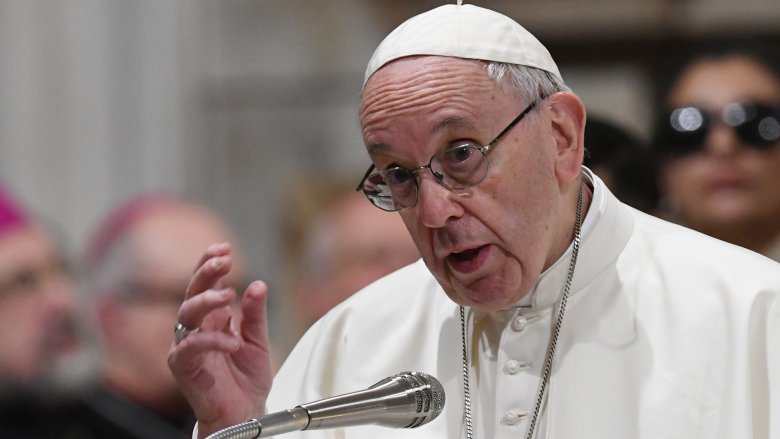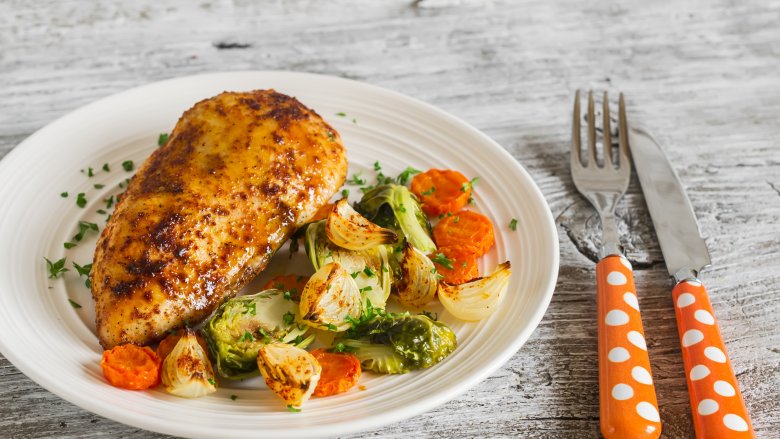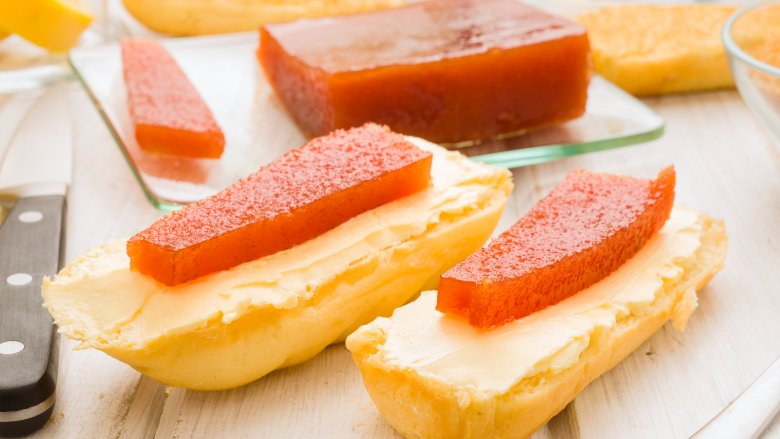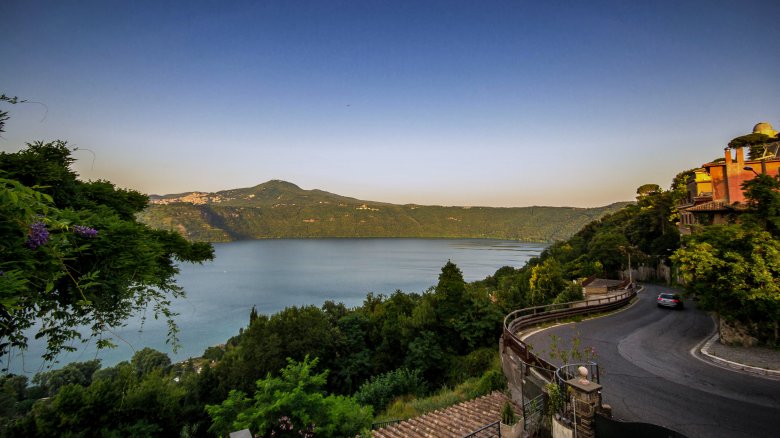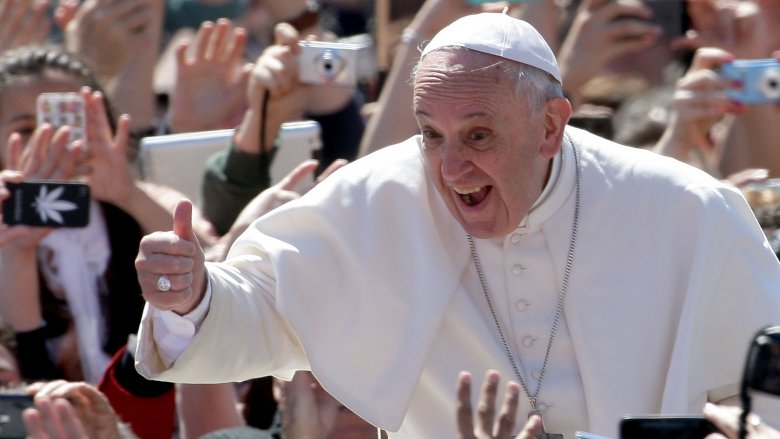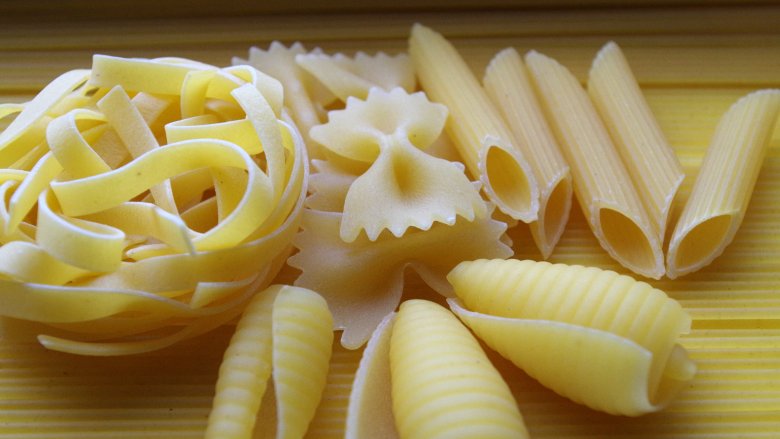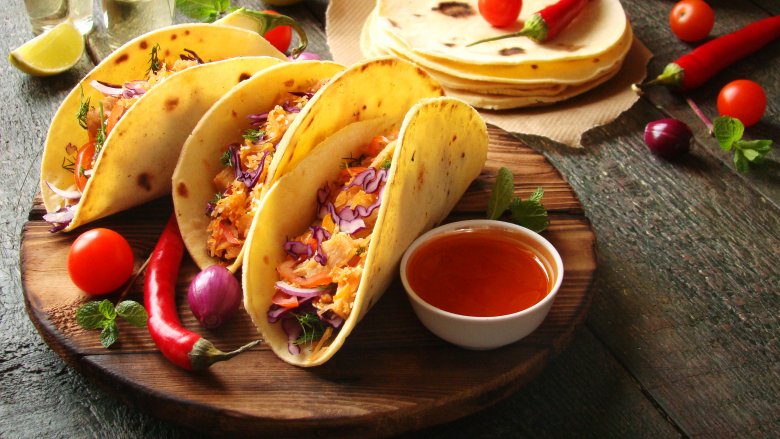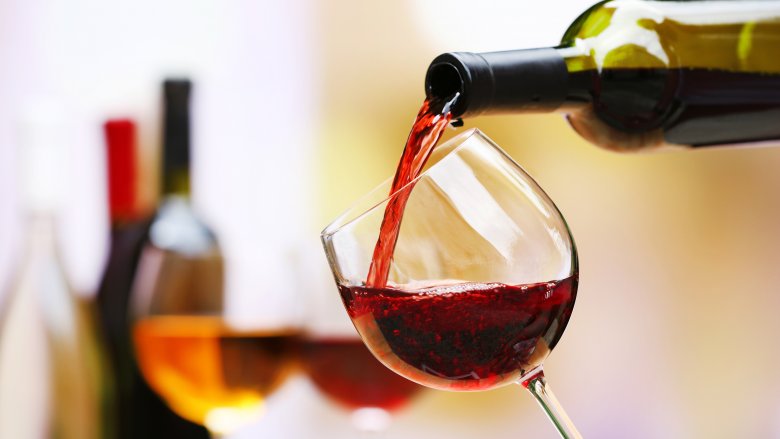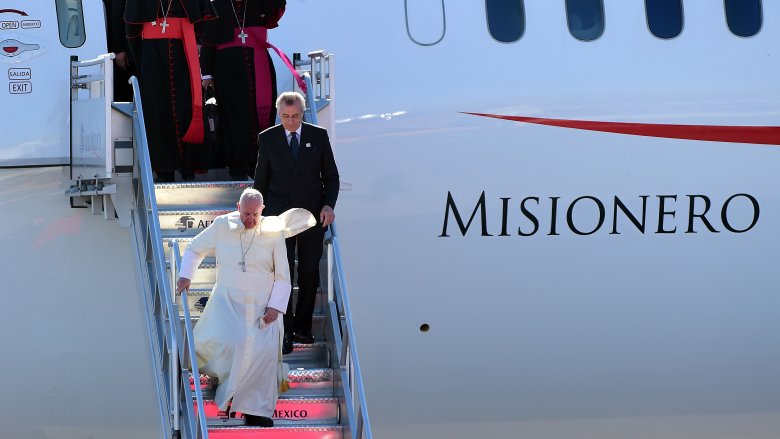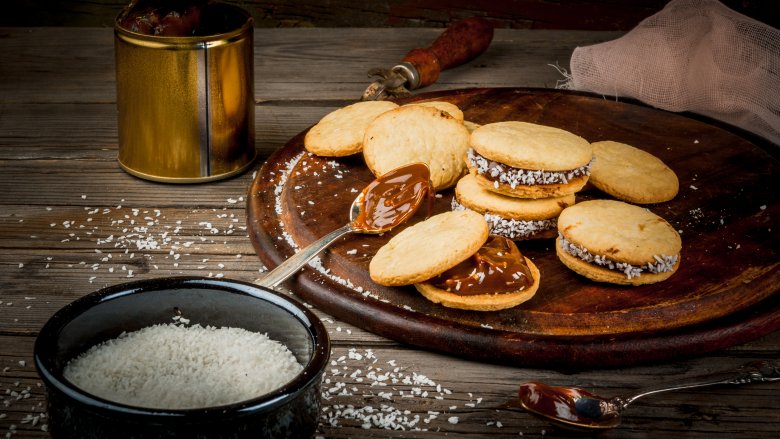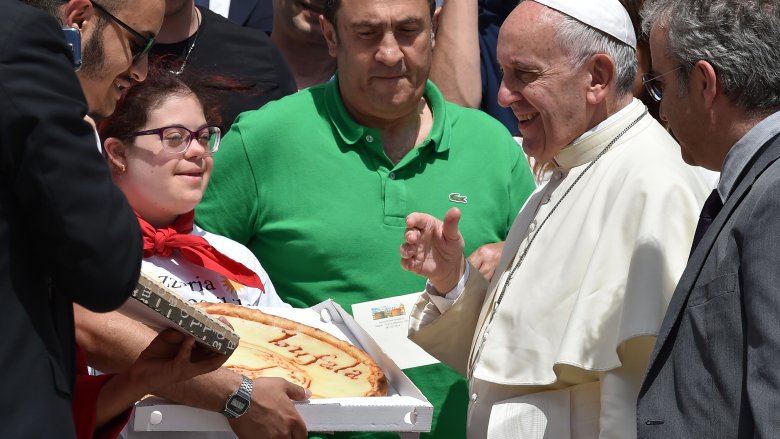This Is What The Pope Eats
There's something weirdly paradoxical about the concept of the pope. Being a Christian, he should be satisfied with a simple life of modesty and austerity. Being a Catholic statesman, he is one of the most famous people on the planet, and, historically speaking, is likely to live better than most kings. The pope, in theory, lives in the gutter with all the other people, dealing out alms and fighting for faith — and, in practice, lives at the heart of a swirling vortex of luxury and ostentatiousness. So what does he eat?
Well, he'll never go hungry, that's for sure. Despite all the pomp of the Vatican, however, the incumbent pope (that's Francis, to you) does keep it on the austere side — sometimes. Other times, he'll eat some of Italy's finest foods and, as befitting a pope for the 21st century, he'll even just kick back with a pizza now and again. He's a complicated guy.
He keeps it simple
OK, let's get one thing straight: By and large, Pope Francis does have a fairly modest diet, especially compared to some of his predecessors. Boniface VIII, for example, ate everything off solid gold tableware while Clement VI literally put the "Pape" in Chateauneuf-du-Pape. Francis, however, is a simpler man. He refuses to wear some of the role's more lavish garments, prefers a sedan to a limousine (a vintage 1984 Renault 4, to be exact), and doesn't mess around with ridiculous headwear.
This simplicity, naturally, extends to his eating habits. He has rarely, if ever, stopped by the two Roman restaurants usually frequented by cardinals and bishops, and his first dinner with the College of Cardinals after his selection to the papacy was a simple pasta dish. Usual dinners might be made up of such trappings as baked chicken with salad, fruit and a glass of wine. The pope may be a lot of things, but one thing he's not is gastronomically extravagant — in any way, shape or form.
Breakfast is light
Pope Francis' daily routine is about as strenuous as you might expect. He wakes up at 4:30 a.m. (!), prays for two hours, meditates and prepares his morning homily. After mass, Francis does a meet-and-greet with some of his followers before breakfast in the hotel dining room at the Vatican's Casa Santa Marta, where he lives. His breakfast is pretty much in keeping with his diet — he'll have freshly-squeezed orange juice (a luxury, actually, considering others in the hotel are only given boxed juices) and something called membrillo.
Membrillo, for the uninitiated, is a sort of gelatinous pasta that's made out of quince and is highly popular in Argentina, where Francis grew up. It's made by reducing quince pieces to a purée, adding sugar and lemon juice, then cooking until it's thick and dark. It's not exactly the most popular or extravagant dish you'll find in Spanish cooking (and certainly not in Italy), but if it's good enough for him, it's good enough for you.
Everything's made with the finest ingredients
So, Pope Francis may not exactly be hosting ridiculous banquets every day or feasting throughout the nights, but his simple diet is, at least, sustained by a fine range of seasonal ingredients and vegetables. In keeping with his writing in Laudato si', Pope Francis' second encyclical, where he states that the fight against injustice and inequality begins with the land, water, agriculture and food, the produce used in the pope's meals are fresh and home-grown.
Well, "home-grown" might be an exaggeration. In fact, they're grown at the Castel Gandolfo, a vast summer residence for incumbent popes which includes a palace, 74 acres of garden and 62 acres of farmland that's used to grow vegetables, keep crops and rear animals. Francis, being largely unaccustomed to holidays, might have given up his private use of the Castel Gandolfo and opened it to the public, but it would seem that his kitchens still use what's grown on the land.
Sometimes he just shows up in the staff canteen
The way dishes are prepared in the Vatican's kitchens follow a similar ideology to the pope's in Laudato si'. Foods that are God-given are utilized first and foremost. This means that things like cheese, cream and butter — foods of the Earth, if you will — are treated with reverence by the nuns who work in the kitchens. Equally, polenta (boiled cornmeal, if you're not aware), gnocchi and pastas also feature frequently on the papal menu. The latter of those, in fact, has appeared so frequently that it's caused a bit of a ruckus in papal politics over recent years — but we'll get to that in a minute.
On occasion, Pope Francis himself has wandered down into the Vatican staff canteen to have lunch with the city-state's staff members. On times like those, he might have something along the lines of pasta, or cod and grilled tomatoes, although Francis, unlike the other employees, tends to get his for free.
He's not allowed much pasta
Vatican City, of course, is in Italy, and eating in Italy means one thing: pasta. Lots and lots of pasta. The stuff is everywhere. Seriously, it's like pasta nirvana. So it's probably as unsurprising as it would be devastating to find out that you're eating too much of it. That, sadly, was the revelation Francis has recently had to face, with Vatican doctors insisting that he seriously cut down on his pasta intake if he wants to stay healthy.
He's had a few health scares before — putting on weight since the election, suffering from back problems, not to mention missing a part of his lung — but this instruction (which came with a supplementary instruction to exercise more) must be the one that stings the most. Just how successful Francis has been in cutting out pasta from his diet isn't quite certain, but we'd be tempted to guess that it hasn't exactly disappeared entirely.
And he's not allowed a load of other stuff, too
It's not just pasta that's cut out of Pope Francis' diet, though. Being a fairly older guy — as most popes tend to be — there are a few other things that are usually left off the papal menu. According to Joe Ibarra, a Mexican chef who cooked for the pope during a visit to Mexico, Francis is basically forbidden from eating anything too spicy or greasy, all fruits had to be seedless to aid digestion, and even his water was imported from the Vatican, since it has a low sodium content.
Ibarra also revealed that eating times are strict for the papal party (breakfast takes 15 minutes, lunch takes 40 to 50 minutes and dinner would last only an hour) due to the pope's busy schedule. That didn't stop Francis, however, from taking some time to visit the kitchens that would be cooking for him and thanking the chefs who fed him. What a champ.
But he's a big supporter of wine
A pope without wine is like king without a kingdom. It's important stuff — not only from a cultural perspective, the Vatican being in Italy and all, but also from an ecclesiastical standpoint. Wine is so damn vital to Catholicism as a whole, it's no surprise that one of Jesus' most regularly retold miracles is his act of turning water (boring, boring water) into wine (fun, fun wine).
So of course it's a big part of his diet. Not only in taking communion, which, of course, is a pretty big deal for the Pope, but also beyond that. Pope Francis has actually elucidated, in the past, how the water-into-wine thing demonstrates how wine is, and should be, the most crucial part of a wedding feast. In an apparent bid to be remembered as the coolest pope ever, Francis explained that "a wedding feast lacking wine embarrasses the newlyweds." Go ahead, then, and crack open a bottle. Jesus would have wanted it.
He dines out when traveling
These days, the pope tends to travel. Visits to other countries are no rarities for modern popes, and what Francis might be eating on any particular day will be dictated by exactly where he is. In 2015, for example, he visited New York City, where he visited Vivolo, an Italian restaurant on the Upper East Side run by Angelo Vivolo. According to Vivolo, there were a few restrictions to what could be served (as you now know), and, surprisingly enough considering his support for the stuff, passed on the wines that were offered to him.
When Francis arrived, he was accompanied by a contingent of Vatican secret service and Swiss guards, and dined with a dozen other people who had accompanied him from Rome. As is tradition, the pope was served first. Unsurprisingly, Francis took a moment of his time to visit Vivolo and his staff in the kitchens when he got the chance.
His favorite foods
He may be God's chief representative on Earth, but the guy's still human. Naturally, then, the pope has his own list of favorite foods — the stuff he really loves more than anything else. On this list, you'll find mate, a kind of tea-like, caffeine-rich drink that's incredibly popular in South America, and which is regularly offered to him by adoring fans and followers. He enjoys meat (more so than fish, though he'll refuse neither) and has a penchant for alfajores, another South American treat — two round cookies pressed onto sweet fillings, often covered in powdered sugar, grated coconut or chocolate.
Francis isn't a fussy eater, though, and will usually happily eat whatever is served up in front of him. Perhaps in testament to this, there aren't really any foods or dishes out there that are particularly known to be disliked by him — only those ones he's not actually allowed to eat.
Naturally, he loves pizza
Time and time again, Pope Francis has demonstrated his love of pizza. In 2013, he celebrated his birthday with a 13-foot pizza, and even once had one delivered straight to the Popemobile. Perhaps the most poignant indication of his love for that most classic of Neapolitan dishes, however, came in a broadcast interview in Mexico, back in 2015 (via USA Today). In a wide-spanning discussion, in which he touched on papal retirement, death and injustice, Francis explained that, despite largely enjoying his time as pope, the one thing he would want is "to go out one day, without being recognized, and go to a pizzeria for a pizza."
Being pope can only be an incredible experience — to travel so far, meet so many people and sit at the top of one of the world's oldest and richest institutions — but, if you ask us, there's something just a little bit tragic about just wanting, more than anything else in the world, to go out and get a slice of pizza without anyone causing a fuss.
